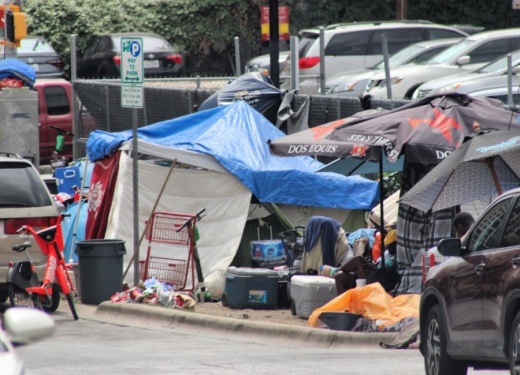Leaders from the nonprofit Save Austin Now, ardent opponents of the City Council decision, have been working since February 2020 to overturn the policy. In Austin, citizens can subvert the regular political process and put policy questions directly on the ballot if they collect at least 20,000 signatures from registered Austin voters in support of the referendum process. Matt Mackowiak, co-founder of Save Austin Now and chairman of the Travis County GOP, told Community Impact Newspaper he guarantees the petition had enough signatures.
“There is absolutely no way on God’s green earth that we did not turn in 20,000 valid signatures this time,” Mackowiak said.
The group tried to get the policy question on the November 2020 ballot, but the petition was rejected after City Clerk Janette Goodall said there were not enough valid signatures.
Mackowiak said his group took no chances this time around, using consumer data and digital tools to target likely signees and then “hammering them” with texts, calls, door knocks and mail, which led to an alleged 30,000 signatures in support since Dec. 1. Mackowiak said they put in “200 hours of manpower over the last two weeks” self-validating the signatures before submitting 24,000 to the clerk this week.
Chris Harris, leader the local homelessness advocacy group Homes Not Handcuffs, called news of the petition submission “unfortunate.”
“The money Save Austin Now has now spent on two separate campaigns in an effort to punish people for being unhoused likely could have housed a good deal of people,” Harris said. “Assuming they have 20,000 signatures, even more money will be spent on both sides of this issues, money that could be going to actually help people.”
Austin’s homeless population has been on a steady incline in recent years. The annual point-in-time count in 2020—a single-night hand count of the homeless population—revealed a year-over-year 45% increase in the unsheltered homeless population. The pandemic has also placed pressure on the city’s homelessness challenges. The city will not conduct its annual hand count of the unsheltered population, and Ending Community Homelessness Coalition Executive Director Matt Mollica told Community Impact Newspaper in November he thinks the economic impact of the pandemic has led to an increase in homelessness.
“I think, anecdotally, probably, as many folks have imagined, in their communities, homelessness is increasing because of the pandemic and because of job loss and the lack of [federal] rent relief,” Mollica said.
Where Save Austin Now received the money for two expansive petition campaigns remains a mystery. Officially, it is registered as a 501(c)4 educational nonprofit, which means it does not have to disclose its donors. Mackowiak said if the petition is validated and placed on the ballot, Save Austin Now will register as a PAC and disclose all donors and expenditures moving forward.
Mackowiak is convinced the city failed to act in good faith with last year’s petition. He and Save Austin Now co-founder Cleo Petricek filed a lawsuit against the city in November for what they claim was a mishandling of the petition validation process.
The clerk must validate the petition’s signatures by Feb. 12 for it to be on the May 1 ballot. Last summer, the clerk took 16 days to determine Save Austin Now’s initial petition was invalid. With 24 days before the deadline, Mackowiak said if the clerk misses the deadline, it would be an “outrage,” and it would mean a postponement on the vote until November.





